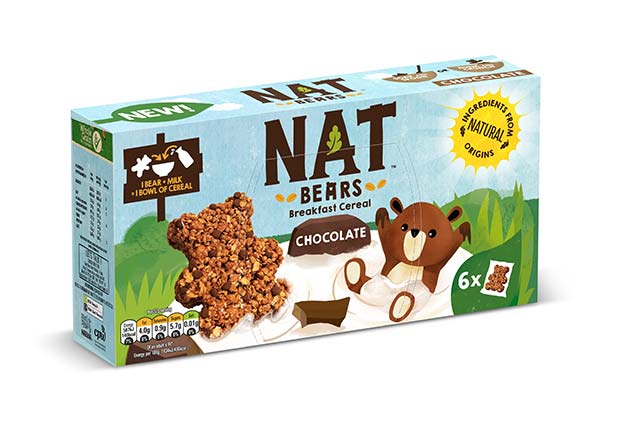Cereal Partners Worldwide is a joint venture between Nestlé and General Mills, formed nearly 30 years ago to produce breakfast cereals. Its iconic brands include Nestlé Cereals’ Shredded Wheat, Cheerios and Shreddies.
 Part of Nestlé Cereals marketing activity is its sponsorship of Paralympics GB, which involves inspiring families to get physically active and support the Tokyo Paralympic Games 2021.
Part of Nestlé Cereals marketing activity is its sponsorship of Paralympics GB, which involves inspiring families to get physically active and support the Tokyo Paralympic Games 2021.
Alistair Lee, Sales Director UK & Ireland at Nestlé Cereals, tells Wholesale Manager what is driving the cereal category and how Covid-19 has affected the market.
What does your role as Sales Director involve on a day to day basis?
My role primarily involves developing Branded and Private Label sales strategies with my wholesale team, while working closely with the marketing team. My favourite part of the role is getting to meet with our customer base to better understand their needs and building strategies that work for everyone.
My experience and understanding of retail, wholesale and foodservice business channels is key to my work, and a lot of what I focus on day-to-day are ways to optimise routes to market.
How big is the cereal market and is it in growth?
In the UK, revenue in the breakfast cereals market amounted to £2,149m in 2020, and it’s encouraging to see our category in such a strong position, with industry sales having grown significantly in the last year.1 Looking at our brands specifically, Cheerios has seen a 20% surge in value over the past year, and Shredded Wheat 7.5%. It confirms that cereals remain one of the most popular breakfast options for consumers despite the uncertainty and change that has occurred as a result of the pandemic.
What are the biggest trends driving the market?
We’re living in uncertain times, which have resulted in a number of interesting new trends within our category. I think it’s been particularly interesting for us to see that quick, easy and convenient breakfast options have remained a priority for many consumers over the course of the pandemic, despite the fact that we all have more time on our hands in the morning.2 So while many people have cut their commute and are working from home more, consumers are still looking for breakfast options that require minimal effort. I think this is largely why ready-to eat cereals are still up top as a breakfast option of choice.
Another trend we are seeing is growing consumer demand for healthier breakfast options. Demand is high right now, with 44% of breakfast occasions chosen this year for health reasons.3 However, lockdown took its toll and people struggled to maintain a balanced diet, with over half admitting to finding it hard to stay healthy in lockdown.4 As we’re seeing more and more consumers prioritise nutrition and look for ways to live healthy lifestyles as the pandemic continues, as a business we’re really focussed on finding ways to improve the nutritional profiles of our cereals to meet this demand.
Our category is already leading in reformulation, but we’re constantly looking for ways to do more. We’ve reduced the average sugar in our own products by approximately 20.6% since 2010. Our SHREDDIES® Original brand has undergone significant reformulation, with sugar content reducing from 14.9g to 12.5g sugar/100g.
It was also really positive to see wider category progress recognised in Public Health England’s (PHE) year 3 report on progress in the sugar reduction programme too. Cereals was one of two specific product categories called out for the greatest progress in sugar reduction, with average sugar down 13.3% between 2015 and 2019.5
We’re also firm believers that instead of pointing consumers to eat less, and focusing on the negative aspects of our diets, it’s important to encourage them to eat more healthy nutrients and ingredients, like whole grain.
Whole grain actually provides a range of the vitamins, minerals, fibre, starch and other nutrients required for a well-balanced diet. During 2019 we increased whole grains in our cereals with 315 million more 16g servings compared with 2003,6 which is another way we’re improving the nutritional profile of our products in line with consumer demand.
What share does Nestlé Cereals have of the cereal market?
Nestlé Cereals currently holds just under 20% of the market and our products continue to be family favourites at breakfast time. Overall, we’ve seen value performance, sales and market share increase year-on-year. During lockdown it was our core, traditional brands that sold best. Our SHREDDIES®, CHEERIOS® and SHREDDED WHEAT® breakfast cereals performed particularly well, which isn’t surprising given these are trusted brands with a long-standing legacy in the UK.
How did the Covid-19 outbreak and subsequent lockdown affect the cereal market?
Over the last few months, saving money has inevitably become more important to shoppers due to the impact the pandemic has had on income and job security, meaning price has played a key role in shopper behaviour. There was a lack of promotions at the beginning of lockdown which had a restrictive impact on category volume growth to start – with higher prices in some areas due to reduced supply.
Shoppers were also discouraged from purchasing more than they absolutely needed, and many chose to use up what was already leftover in their cupboards, rather than returning to the store.8 But given cereal is non-perishable, there were others that wanted their food shop to last longer than usual to avoid returning to store, and these people continued to buy.
As restrictions eased mid-way through the year however, promotions were able to return and average prices fell back down again. We are now seeing volume per household grow, and in the last couple of months the cereal category has been able to boost its volume growth.8
How do you work with wholesalers to grow sales?
Wholesale is an incredibly important channel for us as a business, and we are always looking to form new wholesaler relationships. In my role it’s particularly important that my team foster and grow these partnerships, in order to find new, and innovative ways to work together and build effective business plans. This is what will ultimately help us drive sales and continue to provide more for our customers.
Are you launching any NPD in the next few months?
In September we launched NAT Bears, designed to help parents make breakfast time fun. The product comes in individually wrapped kids-sized portions in a bear shape, which crumbles when added to milk. This has been an exciting NPD for us, not only it’s a unique product, but it also contains whole grain as the number one ingredient.
We also have a number of new NPD launching in 2021 that we are excited to announce in due course.
 What activity do you have around Nestlé Cereals’s sponsorship of Paralympics GB?
What activity do you have around Nestlé Cereals’s sponsorship of Paralympics GB?
As a business we’re very passionate about healthy living and earlier this year we entered into a partnership with the British Paralympic Association to inspire families across the nation to get physically active and support the Paralympic Games.
Encouraging people to get active is particularly important now more than ever. But we know that some people find fitness intimidating, so we want to help people ‘get fit a bit’. Whether its walking the dog, or heading out for a run – fitness looks different for everyone.
Working with the British Paralympic Association, we are giving away £10,000 worth of workout equipment between now and the Tokyo Olympic Games in 2021, and our athlete ambassadors, including Will Bayley, Lauren Steadman, Ellie Simmonds, will be leading live workout sessions on our Instagram channel throughout Summer 2021.
We’ll also have some new on pack designs in 2021 featuring our athlete ambassadors. This will be supported with exciting in-store activations in the run up to games.




Comments are closed.